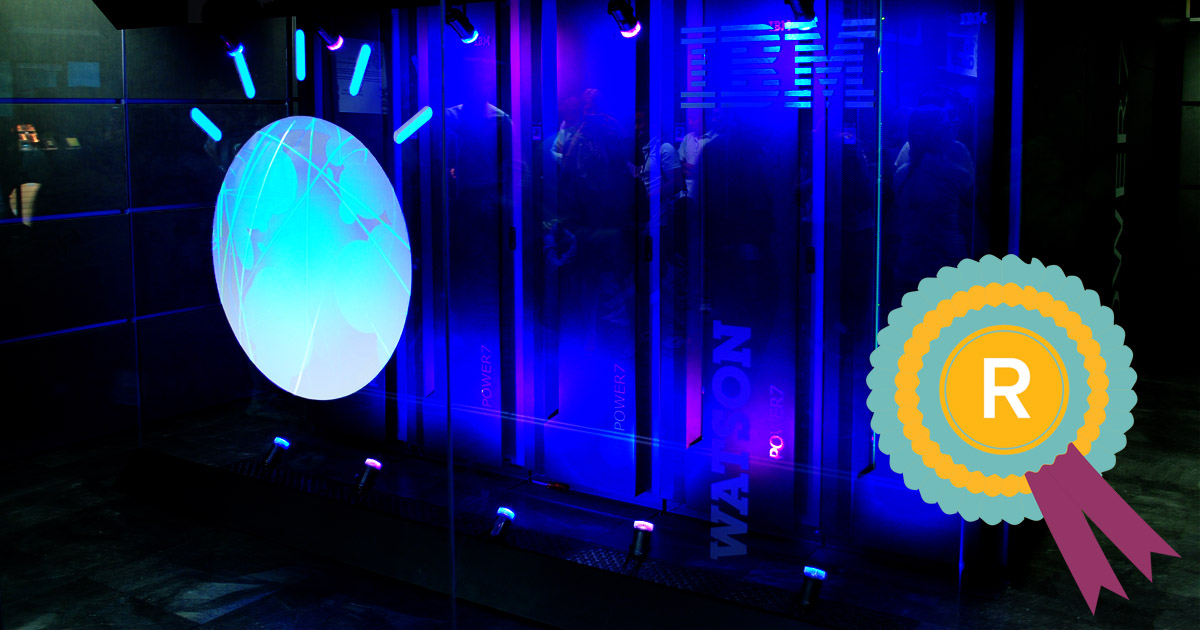AI has an image problem. Between the evil robots that permeate pop culture (thanks, Terminator and 2001: A Space Odyssey) and the likes of Elon Musk regularly reminding us of the dangers of AI, many see artificial intelligence as a source of fear rather than a useful tool.
This is just my (un)professional opinion, but this AI fear-mongering is far too often based on the fiction of AI rather than the fact. Ask anyone who’s spent some time with today’s AI and voice assistant tools, and they’ll quickly remind you that these things aren’t exactly equipped to enslave humanity.
While these technologies can (and certainly will be) very useful, they can also be downright comical. Whether it’s a lack of common sense, or their no-nonsense monotone, AI has a funny side that businesses shouldn’t be afraid to embrace.
That’s exactly what IBM has done with some of its Watson content, and its humorous, humble approach to marketing Watson makes it deserving of a place in the Radix B2B Content Hall of Fame.
From Jeopardy to comedy
Watson made a big debut in 2011, storming through a round of Jeopardy and dismantling its human competitors. So far, so scary AI. Though even in this early marketing stunt, we see a humorous – even human – side to Watson. Who doesn’t get a chuckle out of Watson’s monotone voice asking for a question from the “chicks dig me” category?
This humorous streak continues in a series of videos where Watson interviews a range of celebrities. Each one takes a different slant, both highlighting Watson’s unique capabilities, but also poking fun at the cognitive bot in a box.
“Today on the Watson show”
During an interview with Bob Dylan, the tables are turned on Watson’s usually monotone demeanour, with Dylan’s canned and repeated responses sounding more robotic than Watson’s line of questioning. There are also the less-subtle jabs at Watson’s singing voice; don’t worry vocalists, AI isn’t coming for your jobs just yet.
When interviewing Serena Williams, Watson is quick to point out its ability to rapidly analyse William’s match performance. When it gets a bit too big for its boots though (Watson is the “Serena Williams of cognitive computing”, apparently) the tennis superstar is quick to put Watson in its place. There’s a humility here you seldom see in traditional technology marketing.
When discussing empathy, love and storytelling with Steven King, the horror author extraordinaire urges Watson to “try writing a book. Find a remote hotel… bring the family.” And in a non-celebrity interview that explores its nicer streak, Watson assures young Annabelle that she is in good health based on her records – despite her being too sick to have cake at her birthday last year.
Out of the boardroom, into the zeitgeist
I’ll admit that the series does lean a bit too hard on showing what Watson can do, with jarring interludes from Watson that read more like a dry product brochure than an engaging repartee between interviewer and interviewee. This rubs against the grain of the otherwise light and enjoyable humour in the videos.
But despite some flaws, the Watson conversations do two very important things:
- They disarm Watson. Whether through humour or humility, Watson is clearly not an evil AI overlord. It works with people, discussing their problems and proposing solutions.
- They move out of the realm of marketing material and into general culture. By bringing in recognisable cultural touchstones like King and Dylan, the series pushes beyond the walled garden of B2B marketing content and into the mainstream.
Both of these are done with the concept alone. But the execution brings the wry humour that wraps it all together as a genuinely engaging, enjoyable piece of content.
IBM’s general approach to Watson marketing has provoked the ire of some critics, with commentators noting that – whether due to overexcited journalists, or IBM itself – much of the discussion around Watson is unrealistic and focusses on capabilities that are very much the future of Watson rather than the present.
This all comes back to the problems AI solutions must overcome as they shift from a cultural mainstay into an actual tangible product or service. AI must prove it can really do the things it says it can do, and that it will do them in a way that works with humanity rather than against it.
But if IBM keeps marketing Watson in this way – through videos that demonstrate humility, humour, and empathy – I think Watson might have a fighting chance of entering the public consciousness as a force for good rather than SkyNet coming to life.



